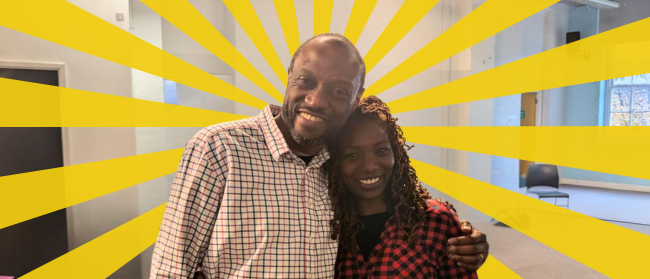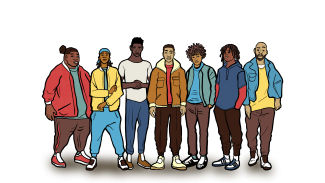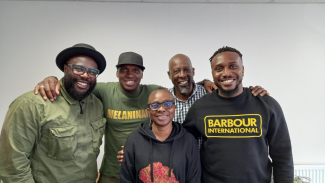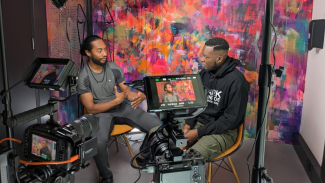FindingJoy,IdentityandConnection:TwocoachesreflectontheBlackHero’sJourney
2025 has been a big year for the Black Hero’s Journey (BHJ), our tailored programme for young Black and Mixed heritage men to explore their identity and come away feeling empowered and proud of their Blackness, and confident in their strengths.
At the close of 2024, the programme was recognised with the Zurich Municipal Award for Diversity and Inclusion; this year, it was recognised at the National Diversity Awards.
After being developed as an innovative and responsive pilot, it’s now become a core part of how we support young people to achieve the change they seek.
We caught up with Frank and Milca, the first two coaches beyond the original development team to deliver the BHJ, to hear their reflections on this new stage in its own journey.
We began by talking about their memories of discovering and delivering this work for the first time.
Frank: “Initially, when I joined Spark Inside, I wasn’t even aware there was a specific Black Hero’s Journey. I wasn’t sure if we needed something just for Black people. But when we did the training I began to understand; the idea that we’re not systemically starting from the same place.”
“When we came to do our training, Michael came to do the bits about history, and he knows so much. At first, I was swotting up, but Michael was so supportive, he let me know he had my back, and gave me the option to decide, what are the bits I want to do? Which are the bits I want to lean into?”
Milca: “I was lucky enough to co-deliver with everyone – Michael, Sam, Tony, Cecilia, Jeffrey – and I could see the differences between them. We all have different styles, different energies.
I was learning from them and also defining what I wanted to bring to that, what aspects of myself would be good to add.”
Frank and Milca reflected on the process of personal transformation delivering the BHJ fostered:
Frank: “One of the things the training did for me was the sections where we talk about Black Joy. Often when people go around the room you realise it’s the stuff that doesn’t take much money to make possible. It’s about connection with people. It’s about eating together, our love for music, dancing, celebrating together. It’s also about celebrating innovation, our lineage. We have so many negative stereotypes, but actually, what are the things we want to celebrate about ourselves and growing up in our culture, that are positive and unique?
Having to dig into my own story to come up with those things was transformational. I thought – if it’s having that effect on me, imagine what effect it’s having on people in prison.”
Milca: “There’s some things you wouldn’t say in the presence of people who don’t relate to your situation, because it can become a conflict or a topic of discussion, when all you want to do is share. If we can relate to each other, it helps to create a bond.
When we’re doing the BHJ, I realised that I can share more of myself, and they can share more in return.”
Both coaches agreed that part of the power of the BHJ was that naming race allowed the young men to take the work to deeper and more expansive places:
Frank: “Interestingly enough for me, race tends to not come up in the coaching itself. It’s more like race is a means of connection and shared experience within the workshop, like “I’ve been there too.”
Milca: “The workshop is about them. Being Black is just one of the layers that their identity is made up of. It doesn’t have to be the focus, but it also shouldn’t be a boundary to what they are sharing. During the coaching, because it’s not a taboo, they are able to share and realise things they wouldn’t normally. They’re able to analyse things differently. Sometimes, this is the first time of their lives they were able to say something out loud, and not feel blamed or judged, not have to justify something.”
Frank: “We talk about things like code switching, needing to change your language, change your accent. We talk about whether that’s smart or ‘selling out’. What I love is that nobody’s trying to find the right answer. We’re trying to have a conversation. It’s ok for people to land on different sides of an opinion regarding that, but we can’t deny it’s a reality.”
“We talk about identity, nationality, we begin to share what that is for you and those all become connection points. The possiping allows us to discuss significant events that shaped our childhood – again, you begin to see common themes there.
If something is systemic, you begin to see again, the system creating similar challenges and environments for people of colour. That’s what makes the BHJ unique; in those workshops, people feel seen, heard, and connect to us because we share that heritage.”
They reflected on their favourite parts of the programme:
Milca: “My favourite part is the graduation ceremony. They need to pick three yes’s and three no’s; things to embrace moving forward and things to leave in the past. When you hear the things they pick, I can see the self-awareness, I can see their growth. I can see the change of mindset.”
“The second is Sawubona. It’s something they keep in mind; they can greet each other when they see each other on the wing, and when we come to coach them. It’s not just “Hey, how are you?” It’s about a new way of connecting directly; to acknowledge each other and our identities. Every time we see each other it’s like a message or something that’s been passed on, and it’s part of the legacy of the BHJ. They are seeing each other above the labels or images they have of themselves.”
Frank: “I already mentioned Black joy, but I also love the Andrew Pritchard story we use for laying out the steps. It made me realise the journey that people could go through when they’re in those settings, it gave me empathy for everybody I was looking at and respect for their lives. It’s easy to look at people where they are now, but what it really empowered me to do was to be able to look at people with the potential that resides in them. Because if someone told you that guy’s story, you never would have predicted where he ended up. It shows everybody in the room there is no limit to what they can become.
“That is a powerful story of redemption, but also a prophecy for the redemption of the people who are in the room if they begin that inner work; that’s what Black Hero’s Journey is inviting them to learn.”
Becoming part of a new cohort of coaches delivering the Black Hero’s Journey means they feel part of an expanding reach and impact:
Frank: “The Black Hero’s Journey has allowed me to discover a passion that I didn’t know I had. It’s helped me appreciate that shared heritage and the influence that gives me, and how to use that for people who maybe society has judged. I have an opportunity in this work that not necessarily everybody has.”
“To give people the gift of Sawubona, and to be able to say I’m here to support you in the way you want; to take your hero’s journey so you can come back and pay it forward by giving rewards and making a difference to people.”
Milca: “I had the pleasure to collect the National Diversity Award with Sam, it was amazing. I was so proud of the work. But at some point, I asked Sam, “Why me, when I’m not part of the original team?” He replied, “Why not you?” We realised the importance of legacy – the more new coaches we can have, the more people we can help, the more we can share this experience with them as that’s what these young men need. I hope there will be someone else in my seat in a few years, saying the same thing!”
We parted with some words of advice for new coaches delivering the BHJ:
Milca: “Focus on being present. Focus on being authentic. Learn what you can but focus on being vulnerable and being real. With young people in prison, being real is important; they can feel your energy. It allows them to know it’s okay to be human, okay to be who you are, where you are, and know there’s growth to be had. Lean on the support of others; at Spark Inside, there’ll always be a good structure and someone more experienced to work alongside.”



